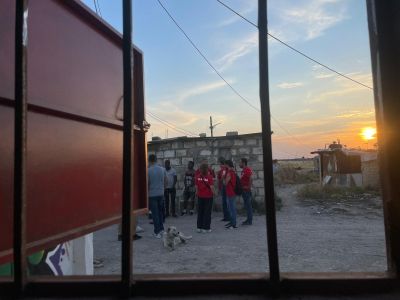Thousands of agricultural workers are living in slum conditions while working for employers in receipt of EU farming subsidies, a delegation of trade unionists and MEPs found today during a visit to Italy.
The delegation organised by the European Federation of Food, Agriculture, and Tourism Trade Unions (EFFAT) visited Borgomezzanone, the biggest shanty town in Italy (Foggia, Puglia) where migrant workers don't have access to running water, and use whatever materials they can find to put a roof over their heads.
In a trade union action on the ground, the delegation visited farm workers from the field to hear directly about the difficulties of working in agriculture and the hardships of going back to deplorable accommodation after long and difficult days harvesting under a scorching sun.
The visit is part of EFFAT mobilisation to ensure the forthcoming reform of CAP raises labour standards in agriculture, and for an EU directive to limit subcontracting and tackle gangmaster practices which leads to abuse of vulnerable workers.
In the aftermath of this visit, EFFAT and the ETUC urgently call for a socially inclusive EU migration policy — one that ensures every worker, regardless of migration status, is treated with dignity, respect, and fairness. The Delegation was led by Italian EFFAT affiliate Flai CGIL.
Esther Lynch, General Secretary of the European Trade Union Confederation, took part in the delegation. Speaking afterwards, she said:
“What I have seen here is just unacceptable. Thousands of people are doing a backbreaking day’s work in the fields in dangerous temperatures and then coming back to sleep in wood or tin huts.
“I have only respect for the workers who have found a way to build a life here. The problem here is with employers and their gangmasters who are prepared to exploit the most vulnerable workers in this way and a Government that is failing to secure even the basics such as running water.
“The European Commission needs to safeguard and strengthen the principle of social conditionality achieved in the last CAP reform and ensure that decent living standards for farm workers are a basic prerequisite of receiving public money.”
Enrico Somaglia, General Secretary of the European Federation of Food, Agriculture and Tourism Trade Unions said:
“Today we brought Members of the European Parliament and representatives of the Commission to Foggia to see what it really means working in agriculture and living in deplorable conditions. Addressing poverty wages, working in heat, gangmaster practices and the end of shantytowns is also an EU responsibility.
“EFFAT has developed a Model Directive on labour intermediaries and fair working conditions across subcontracting chains offering clear solutions to tackle criminal labour intermediation. Ahead of the publication of the CAP reform in two weeks’ time we reiterate our call for a text that truly delivers for farm workers, in line with EFFAT demands.”
Notes
For more information and interview requests, please contact EFFAT head of press and communications Maddalena Colombi: [email protected] / 0032 488 337 409
The delegation was accompanied by representatives of the European institutions
MEP Estelle Ceulemans (S&D, Belgium)
MEP Camilla Laureti (S&D, Italy)
MEP Rudi Kennes (The Left, Belgium)
Francesco Corti, Member of the Cabinet of Roxana Mînzatu Executive Vice-President for Social Rights and Skills, Quality Jobs and Preparedness

